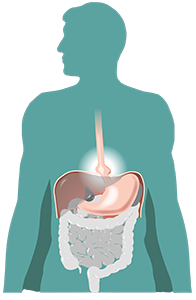Services
Hiatal Hernia Treatment
A hiatal hernia is a common gastrointestinal issue, especially for those over the age of 50. The symptoms can be unpleasant, but fortunately, most cases are mild and easily treatable. If you’re experiencing gastrointestinal pain or discomfort, contact a medical professional. By treating the issue early, you can restore your quality of life and have peace of mind.

What Is Hiatal Hernia?
A hiatal hernia forms when your stomach bulges through your diaphragm, which is the muscle separating your chest and your abdominal cavity. People of all ages can have hiatal hernias, but they’re particularly common in women, adults over the age of 50, and people who are overweight or obese. There are two types of hiatal hernias: sliding and paraesophageal. Sliding hernias are more common and tend to be less serious. They occur when both the esophagus and the stomach slide up through the diaphragm. With a paraesophageal hernia, only one part of the stomach moves into the chest cavity next to the esophagus. This can cause the stomach to lose its blood supply, so it can have more dangerous consequences.

What Are the Common Symptoms?
Sometimes, hiatal hernias cause no noticeable symptoms. Other times, the condition causes various gastrointestinal issues. Here are some of the most common signs and symptoms:
- Heartburn or acid reflux
- Regurgitation of food or liquids back into the mouth
- Pain or burning in the chest or abdomen
- Difficulty swallowing
- Shortness of breath
- Nausea and vomiting
If you experience severe pain, vomiting of blood, or the passing of black stools, seek medical help right away. This may be a sign of a paraesophageal hernia that has cut off blood supply to your stomach, which requires immediate attention.
Causes and Risk Factors
Doctors and researchers don’t know the exact cause of hiatal hernias, but they are most common in people who are obese, have diabetes or pre-diabetes.
How Do You Treat A Hiatal Hernia?
If you’re not experiencing pain or other symptoms, you may not need treatment for your hiatal hernia. However, there are several treatments that help to manage symptoms and to repair the hernia. For acid reflux caused by the hernia, your doctor may recommend antacids or prokinetics to reduce discomfort. In some cases, hiatal hernias require surgery. This typically involves pulling the stomach back into the abdomen and reducing the size of the opening in the diaphragm. Lifestyle changes can help with symptom management, as well. For example, limiting acidic foods and fried foods may prevent acid reflux. Losing weight and quitting smoking may decrease symptoms, too.